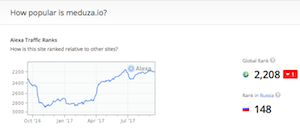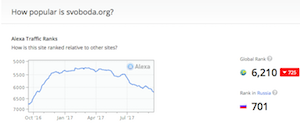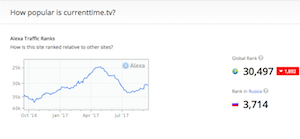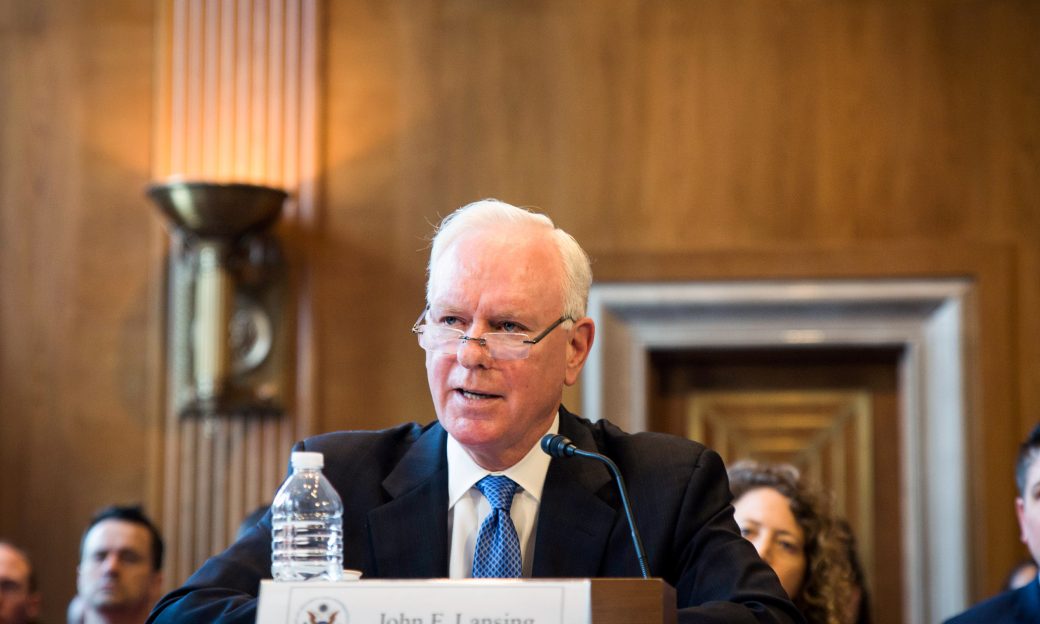OPINION
Blind Spots
Broadcasting Board of Governors Information War Lost
By The Federalist
The Russians. Yes, always the Russians.
To paraphrase one of our colleagues,
With their appointments secured under the Obama administration and with no sign the Trump White House is outwardly making progress toward replacing them, the heads of the U.S. government Broadcasting Board of Governors (BBG) and Voice of America (VOA) are doing everything they can to play up what they claim is a record of success in the information war with Russia, a contest critics say has already been permanently lost by the United States.
Let’s see how this plays out.
Blind spots.
The BBG is in plentiful supply of them. One of the reasons is lack of leadership. This certainly applies to the woeful trio of John Lansing (the agency CEO), Amanda Bennett (VOA director) and Jeffrey Trimble (BBG Deputy Director). They have no leadership skills needed for U.S. public diplomacy, U.S. government service or managing federal workforce. They encumber leadership positions. However, their skill sets are non-existent or at best loaded with a negative record and negative consequences. They are by no means the only ones with this problem in the agency’s pecking order. There are others. But the problems start at the top and are flushed through the rest of the agency.
- What kind of leader or leaders — in government or in private sector — allows reporters whose salaries are paid by U.S. taxpayers to call in public the President of the United States or refer to him as “F*cking Von Clownstick,” “joke,” “punk,” “dog,” “pig,” “con,” “buls**t artist,” “mutt,” “idiot,” “fool,” “bozo,” and “blatantly stupid”
without any context, balance, response, or any opposing viewpoint?
An effective leader would never let this happen in the first place. If it happened once, an effective leader would make sure it would never happen again. When it happened multiple times and continues to happen, an effective leader would not tell NPR: “We have the greatest respect for the President.”
Months later, “F*cking Von Clownstick” post by a VOA English reporter can still be seen on Facebook with likes and a comment from other VOA English reporters.
- What kind of leader would continue to employ a contractor for VOA English who uses an obscene gesture toward peaceful demonstrators, including women who were protesting against the Iranian regime? What does this incident say about the agency’s mission of supporting freedom and democracy abroad?
- What kind of leader would allow chairman of the board, who is himself a high-ranking U.S. government official nominated by the President and confirmed by the U.S. Senate, to travel to Russia on a private passport to do corporate business, and on top of everything else, would travel with him in an official capacity only to be led into a KGB-like trap?
- What kind of leader would ignore the fact that another leader is making multimillion dollar business deals in a country lacking free media and continues to serve overseeing programming to that country?
- What kind of leader would allow another leader to make decisions about programming to a country where the person’s family has multimillion dollar business investments?
- What kind of leader would tolerate five frontline journalists being suspended and humiliated by the management for doing what they thought was the right thing to do in protecting the organization’s reputation?
These are some of the blind spots of BBG and VOA leaders, but one of the most evident ones comes in the category of knowing your audience. We consider the following:
On September 14, 2017, Lansing testified before the Committee on Security and Cooperation in Europe on Russian cyber warfare and disinformation operations.
In his testimony, Lansing threw out audience numbers in an attempt to lay claim to program effectiveness. For example, Lansing makes a claim of a 278-million weekly audience across various media platforms, in 100 countries in 61 languages (accounting for both VOA and the language services of Radio Free Europe/Radio Liberty (RFE/RL), and others which overlap VOA language services).
We don’t find the agency’s numbers credible. We never have.
But even if accepted at face value, one must consider these numbers in the context of a global population of:
7-Billion.
How many of these claimed millions of listeners or viewers are for programs that BBG deliberately pre-censors or removes news altogether, thus violating the VOA Charter, so that they can be placed on networks in countries that already practice government censorship and censorship by intimidated media owners and journalists?
How many of these claimed millions of listeners or viewers are in countries that already have relatively free media rather than in countries without free media or in countries of primary strategic importance for the United States?
Next, when arguing about the effectiveness of its “Current Time” broadcasts targeting Russian speakers, Lansing makes a claim of millions of views over a seven month period, from January – July 2017.
Wait a minute.
Why over a seven month period?
How come independent Russian news outlet MEDUZA based in Latvia and a budget far less than what the BBG spends on Russia is ranked 148 in Russia, with one (1) being the top ranking, while BBG’s Radio Liberty is ranked 701 in Russia, and BBG’s premier Russian-language multimedia site is ranked 3,714 in Russia?



Whatever minimal audience engagement on social media the BBG can claim, how much of it is purchased with boost ads paid by U.S. taxpayers and amounts to nothing more than a meaningless “Like” on Facebook or Twitter by a user who does not even look at the news report. How many are in response to a fluff animal video or Radio Free Europe/Radio Liberty (RFE/RL) or VOA videos that actually help to spread Putin’s propaganda?
“This is how Current Time TV [joint VOA and RFE/RL BBG project] is countering Russian propaganda… with bad-taste sexual allusions about cows [and cow inseminator] in the introduction,
and even more in the actual clip,” one RFE/RL journalist reported.
Also consider the following facts:
Why almost half of Voice of America web traffic for VOA English-language content comes from the United States, even though Congress clearly wants VOA to target only foreign audiences?
Are the U.S. numbers included in BBG’s weekly audience estimates? Are they specifically excluded, as they should be?
VOA correspondents rarely get more than a dozen retweets for almost all of their posts. The only time they get a larger number of retweets is when they do a post critical of President Trump which is then picked up by a mainstream U.S. media outlet. Almost all of these retweets are from Americans following a U.S. media outlet and if there are any comments on the VOA tweet, almost all of them are highly critical anti-Trump comments, also from Americans. Isn’t this a sufficient proof that:
some of VOA English news content is biased?;
VOA’s greatest impact on public opinion is in fact in the United States, which is against the wishes of Congress and against current U.S. law?
Compared to BBC, RT, or any major U.S. media outlet such as The Washington Post or The New York Times, VOA’s audience engagement on social media is truly dismal, considering that VOA’s audience at least ought to be worldwide.
But there is something else at work.
There is no evidence of material impact with audiences and just as importantly no material impact on the actions of the Russian government to curtail its propaganda and disinformation operations.
We came across the following that might also be of some consequence:
In a Washington Post op-ed piece (“Seeing America the way the rest of the world does,” Sunday, September 10, 2017, also republished by The Houston Chronicle) writer Suzy Hansen notes in part,
“The Pakistani novelist Kamila Shamsie once observed there are ‘two Americas’ – one at home and one abroad. The first is the America of Hollywood, work-in-progress democracy, civil rights movements and Ellis Island. The second is the America of coups and occupations, military dictators and CIA plots, economic meddling and contempt for foreign cultures. The rest of the world knows both Americas. But as Shamsie has written, Americans don’t seem aware of the second one at all.”
It is this “second America” that is the fertile backdrop of Russian cyber warfare and disinformation programming.
Without being overly simplistic, all the Russians have to do is focus their propaganda on one question: “What has America done to you today?”
Most assuredly, that is the essence of what the Russians are doing, using disinformation as an effective generator of anti-American sentiment.
That is one of the main challenges.
The other is knowing your opponent.
It is not remotely likely that Vladimir Putin cares what John Lansing thinks. What is more likely is that Putin believes he owns the BBG.
What do we mean by that?
Consider if you will the former BBG chairman and still BBG Board member, Jeff Shell who the Russians unceremoniously kicked out of Russia and sent flying away before getting out of the Moscow airport. Let us also remember that Shell was accompanied by Lansing and Trimble. Apparently, they were allowed to stay, but who cares. The Russians got their man. Leaving Lansing and Trimble stupefied in the Moscow terminal made the pair look like naive American government bureaucrats who helped their boss walk into a trap – as they deserved to be viewed. Their job was to persuade Shell not to go to Russia on a dubious private/official business trip and not to go there with him.
And consider the all-too-often Obama administration response which amounted to, “Oh, well.” That in itself sent a clear message to the Russians that the BBG was, well, unimportant, irrelevant, powerless.
And so it has become. Eight years worth of being unimportant well underway even before the Shell debacle.
The reality is this:
The Russians are running their playbook, not unlike any American high school football coach. The strategy is the same: they will run it and force their opponent to stop it.
In the case of the Russians, the playbook has been relatively well thought out and effective. It has been expanded and improved upon, being revised to accommodate new opportunities.
So far, an effective counter to the Russians is not happening and is not likely to happen in the hands of the BBG, Lansing, Bennett and Trimble.
Let us consider another Lansing “moment:”
This time the focus is on Cambodia.
With all that is going on in the rest of the world, Cambodia is in the unlucky position of being a sideshow of reduced visibility.
Things are dicey in Cambodia. Prime Minister Hun Sen is up for re-election. He is doing everything he possibly can to make sure the result is pre-determined and that includes arresting and jailing opposition leaders and shutting down foreign broadcasters and radio and television stations carrying foreign broadcaster program content.
In a statement dated September 12, 2017 Lansing noted in part:
“We condemn this crackdown and again call on the Cambodian authorities to permit journalists to do their important work in safe, unfettered conditions; and to allow the programs of BBG networks back onto FM stations in the country. We salute the dedication and determination of the journalists of RFA, and independent media outlets in Cambodia who provide much-needed news and information to audiences eager for the truth.”
Ask yourself:
Does the Cambodian government care what John Lansing says?
For the most part probably not, with one exception:
The agency’s Cambodian (Khmer) services at the Voice of America and Radio Free Asia (RFA) are doing exemplary work and have been doing so long before Lansing and Bennett showed up. Some might even say presently in spite of Lansing, Bennett and the rest of the inept bureaucrats on the Third Floor of the Cohen Building in Washington, DC.
But now that puts their reporters in Cambodia on Hun Sen’s radar and that is often something that does not go well, definitely for Cambodians.
The “Cambodian government” is Hun Sen. This “government” functions more like a criminal organization than a government with rampant corruption all the way down to the village level.
Hun Sen lacks the intellect and cleverness of Vladimir Putin. But his organization excels in brutality with opposition leaders sometimes being gunned down in broad daylight as happened last year to Cambodian commentator and activist Mr. Kem Ley.
Recently, the State Department issued an advisory to Americans inside Cambodia warning them of the deteriorating situation in the country.
For his part, Hun Sen has stated publicly that the US Government has tried to overthrow him. He has also claimed that if he is thrown out, there will be war in Cambodia. This is not all that far-fetched as his ouster would create a power vacuum with various military and police commanders jockeying to take over the country. And more than likely Hun Sen and his family face the possibility of being killed.
Aside from what is being reported by the agency’s Khmer Services, many Cambodians are well informed. They have relatives all over the world: in the United States, Canada, France and Australia, for example. They communicate regularly by phone, Facebook and other resources. They are not solely reliant upon the BBG for information. They are not oblivious to what is going on. They are living it every day. They know quite well: Hun Sen has the guns. “Democracy,” if you want to call it that in Cambodia, is rice paper thin.
Thus, in its way, Lansing’s statement adds to the volatility but resolves nothing and helps no one.
And that’s not being smart at all. It is being reckless with the lives of agency employees and contractors in Cambodia. Matters are well beyond Lansing’s control or his ability to influence for the better.
It shows that the agency has limited options and is not capable of adjusting to changing circumstances. Making demands of the Cambodian “government” amounts to an exercise in stupidity.
If the agency’s Khmer services have a robust Facebook presence, right now, that is the best game around – rather than making demands of the Hun Sen regime which likes to make a point with dead bodies.
At the end of the day, whether it is Lansing, Bennett, Trimble or anyone else in the leadership-deficient BBG structure, they cannot admit that they have been out-maneuvered and outplayed, particularly by the Russians, but also by the North Koreans.
When North Korea had its major nuclear blast, VOA did not have a shortwave radio program on the air, as some VOA employees noted online. Lansing did not think that a major expansion of VOA shortwave radio broadcasts to North Korea was necessary, even though there were plenty of signs that the Pyongyang regime was getting ready to conduct a major nuclear test. Did he think that the North Koreans will get their information from the United States from the Internet? Some of the high-ranking regime officials might if they are not afraid of being shot for going to the VOA site. The vast majority of the population can’t.
BBG and VOA public pronouncements come across as whining and complaining, trying to lay claim to a moral high ground which at this juncture is not working well for them. The end result is being held in even greater contempt. These adversaries don’t share our values and at present that gives them an edge: in blocking agency programs, closing in-country facilities and throwing people out of the countries to which agency employees are posted.
Reliable alternatives are limited at best, leaving the agency ineffective in its mission and a nagging, chronic liability.
These regimes know how easy it has become to block agency programs and do it without a second thought.
The Federalist
September 2017

